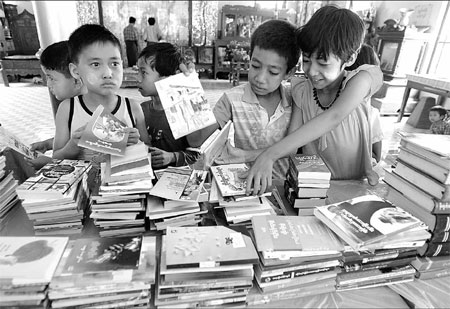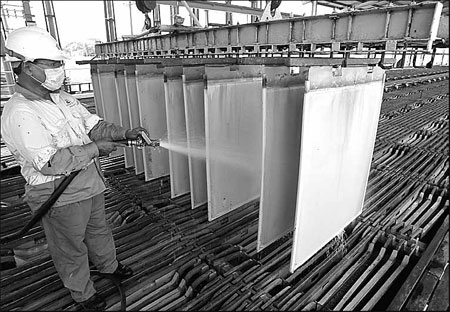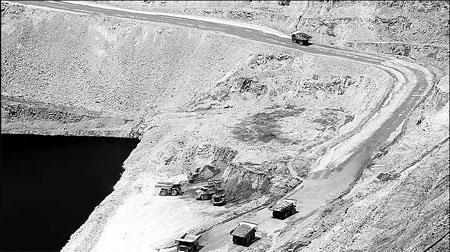Troubled copper mine back on track

|
Pupils from villages near the Monywa Copper Mining Project accept books donated by Wanbao Mining. The Chinese company has promised to inject $1 million annually to build libraries, kindergartens and other infrastructure to benefit the local community. Photos by Zhang Wei / China Daily |
|
Ore is smelted at the mine and processed into sheet copper. The wet smelting process used at the mine has great advantages in environmental protection. |
|
The Monywa Copper Mining Project, a section of which is shown here, is a cooperative effort of Chinese and Myanmar enterprises. Of the project's four sections, Letpadaung Mine has the largest resource reserve, accounting for 75 percent of the total. |
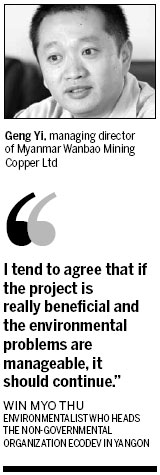
Company urged to engage the public, increase transparency
Editor's note: China Daily continues its coverage from neighboring countries in an effort to provide insight into topics of significance to China. In the third installment of a four-part series on Myanmar, we report on Chinese investment in the country.
Geng Yi, the managing director of the Letpadaung Copper Mine, is cautiously optimistic that one of China's largest investments in Myanmar will "soon be back on track". Months of protests by local farmers and activists had brought operations to a halt.
The project, a joint venture between China's Wanbao Mining and its Myanmar partner, Union of Myanmar Economic Holdings Ltd, was launched in March last year. However, operations were suspended at the end of November after local villagers and opposition activists began protesting about controversial land acquisitions and the mine's impact on the local environment.
A "ray of hope" appeared in March when a government inquiry commission, chaired by Myanmar's opposition leader, Aung San Suu Kyi, released the results of its investigation, which found the copper mine to be economically beneficial. The commission said the mine should be allowed to continue operating.
However, the report also said the project needed greater transparency, adding that the locals' concerns about compensation and the environment should be addressed.
"We think it is an objective verdict and reflects the situation in a faithful manner," Geng said. He said Wanbao and its Myanmar partner are making the changes suggested in the report and creating more benefits for the local community.
Wanbao has spent $5 million in compensation for the villagers' land and another $6 million in building new houses for them and relocating their temples.
Geng said Wanbao built small- and medium-sized enterprises to ensure that local farmers had jobs after their land was appropriated and it provided them with systematic training. In addition, at least one member of each relocated family will get the opportunity to work in the copper mine.
In the future, the company should provide more access to improve the project's transparency and have more public consultations, according to Win Myo Thu, an environmentalist who heads the non-governmental organization ECODEV in Yangon.
"I tend to agree that if the project is really beneficial and the environmental problems are manageable, it should continue. But we need more information," said Win Myo Thu.
Chen Defang, president of Wanbao Mining, admitted the company had failed to consult locals enough.
"Local people were not involved in our development plan," he said in an interview with The Wall Street Journal.
Greater engagement
The Letpadaung mine is part of the company's Monywa copper mine project in Sagaing Division, northwestern Myanmar, which Wanbao took over from Ivanhoe, a Canadian company, in 2010. Wanbao had invested about $500 million in the project by October.
Because his company has a Chinese background, it usually finds itself under fire, Geng said.
His observation was supported by Win Myo Thu, who said there was a group of people in Myanmar who wanted to turn public anger into anti-China sentiment.
The protests against the Letpadaung copper mine were also fanned by some of the local media, and the mine was not the only Chinese-backed project in Myanmar to be targeted in this way. In 2011, the construction of a proposed $3.6 billion dam by a Chinese company was postponed because the project, it was claimed, was contrary to the will of the people.
Chinese companies should do a political analysis and risk assessment before starting a project, and should be aware of the complexities of Myanmar's ongoing democratic transition, Win Myo Thu said.
Myanmar and China should also work together and establish a platform to exchange information and identify public concerns, he suggested.
"It is very important not only to improve the image at project level, but to improve China's image with citizens by engaging with everybody," he said.
Wanbao is interacting more actively with the local media and NGOs, and it is also using social media such as Facebook to help keep people informed of the latest developments.
The company established a new community and social development department and promised to inject $1 million into it every year. The department will build libraries, kindergartens and other infrastructure. A 10-member medical team was created in May 2012 to provide medical services to 28 neighboring villages.
'Resource curse'
A country with abundant mineral resources should be considered blessed, insiders said. But the promise of Myanmar's rich mineral resources has been overshadowed by concerns about so-called "resource curse", they said.
As energy security becomes increasingly important in Asia, Myanmar is well positioned to help supply the region's energy needs, especially the region's three leading economies, China, India and Thailand, said Soe Myint, a retired official from Myanmar Ministry of Energy.
"But an immediate challenge facing Myanmar is how to balance its resource-based development because the country must manage its natural resources to fuel its economy through exports while catering for its own development needs," he wrote in an article in The Myanmar Times.
Several other countries' projects are also under fire, according to Win Myo Thu. A large coal-fired power station in southern Myanmar, built by a Thai company and a Japanese company that claims to be using clean coal technology in Myanmar, have all faced environmentalists' skepticism.
Oil and gas account for the majority of foreign investments in the resource-rich nation.
And despite the rapid inflow of Western capital, China remains Myanmar's largest investor, accounting for 33.8 percent of all foreign investment in the country.
Talking with China Daily in April during his visit to China, Myanmar President U Thein Sein said his government welcomes Chinese companies investing in Myanmar, especially if it can creates jobs. "Myanmar has improved its laws and regulations to legally protect the interests of investors."
After the commission's report into the Letpadaung copper mine was released, China's Foreign Ministry spokeswoman Hua Chunying said the Chinese government will continue to encourage Chinese enterprises to carry out cooperation with Myanmar to achieve mutual benefits.
There is still great potential and ample space for China to deepen its economic cooperation with Myanmar in all fields, according to Li Chenyang, director of the Myanmar research center at Yunnan University.
"We need to peacefully coexist, otherwise nobody can benefit," Win Myo Thu said. Establishing more people-to-people exchanges to promote mutual understanding and alter people's misconceptions is very important, he said.
qinzhongwei@chinadaily.com.cn
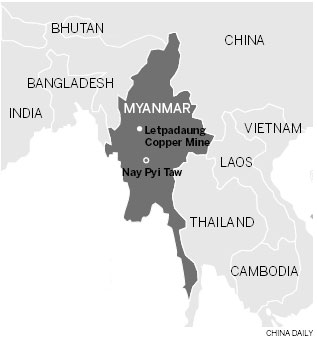
(China Daily 06/20/2013 page11)


